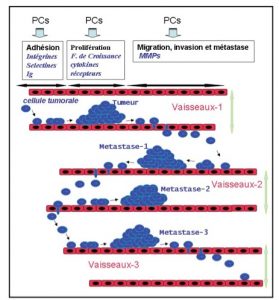PCs and Liver Colorectal Metastasis
(Group : Preprotein Convertases, Tumor Invasion and Metastasis)
As many as 50 % of patients with a primary malignancy will develop metastases in the liver, a greater percentage than for any other organ, including the lungs. Although the liver represents a common site of spread from many solid tumors arising in other sites, such as the breast and lung, isolated hepatic metastases most commonly occur from colorectal and neuroendocrine tumors.
At present, surgical resection is the only curative option and it produces a 30%, 5 year disease-free survival rate at best. In order to improve these statistics the biology of liver metastasis needs to be better understood. Of particular interest are the proprotein convertases, enzymes that are directly involved in the activation of many molecules that have a significant role in tumor progression and metastasis.
The proposed study represents a complementary and symbiotic team effort between scientists and clinicians to address the relevance of PCs and their substrates expression in colon cancer and its corresponding liver metastases.
 |
| Cascade events implicating PCs for tumor growth and metastasis. PCs control tumor cell adhesion by activating or/and inducing the expression of adhesion molecules, regulate cell proliferation by activating growth factors, cytokines, and their receptors and induce migration and invasion of tumor cells that leads to metastases formation by activating MMPs. |

